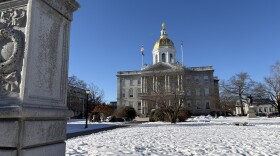The Governors of New England and the premiers of the Eastern Canadian Provinces have just wrapped up a meeting in Bretton Woods, New Hampshire. The conference was focused on the issues of energy and trade, though dueling protests outside the conference meant energy stole the spotlight for much of the event. But the speakers and resolutions of the conference barely touched on the most pressing energy issues facing New England, and this careful side-stepping of the issues is a reflection of a tumultuous energy landscape.
Even before the one day summit got underway on Monday, demonstrators were out in force. They waved signs both for and against the Northern Pass transmission line, and another group – Tar Sands Free New England decried any expansion of fossil fuel infrastructure.
“All the New England governors signed a letter to NEPOOL asking to increase electric ratepayer’s fees in order to pay for Kinder-Morgan and Spectra to build these pipelines,” Dorian Williams of the Massachusetts based better future project told a crowd on Sunday afternoon, eliciting boos. “It is not in the public interest, it is in fact incredibly destructive to the public interest so the fact that we would be paying for that infrastructure is abhorrent.”
But inside the Mount Washington Hotel these hardly made the agenda. Instead there was a forum on quote “Energy Innovations for a Competitive Economy,” focused largely on R&D.
“There’s a little bit of, kind of like Kremlin watching,” explains Jim Monahan with the Dupont Group, a lobbying firm that does work for independent power-plant owners.
Understanding this event is all about reading between the lines of what is said publicly.
“I know there’s – beyond the public events here – there’s a lot of informal activity, and I think it takes some time before they reach any consensus before they come out and publicly announce anything,” says Monahan.
There were two of the five Canadian Premiers in attendance, and five of the six New England Governors. Maine Governor Paul LePage told Maine Public Broadcasting last week that he would not attend the conference in order to focus on his reelection campaign.
New Hampshire’s Governor Maggie Hassan said creating jobs was the focus of the conference for her. But beyond that, or even on how specifically to do that, finding public consensus seemed difficult.
But just because little is said publicly doesn’t mean these meetings are inconsequential. Some of the issues that drew out the protesters started as abstract conversations at this same summit a few years back.
“So what is now unfolding in a fairly messy and contentious way around the Southern New England States talking about coming together to buy, whether it’s renewable energy or power coming from hydro and such, developed out of this forum,” says Seth Kaplan, a Vice-President at the Boston based Conservation Law Foundation.
Last September, at the last meeting of the governors and premiers, they passed a resolution stating that the group affirmed its support for that effort to come together and pay for energy infrastructure together. This time around, there was no mention of the effort in the resolutions. That led some attendees to speculate that perhaps charging electric ratepayers for big hydro-power transmission lines and natural gas pipelines is not such an easy sell.
But Connecticut’s Governor Dannel Malloy was quick to dispel that notion, pointing out New England electric customers paid $3 billion more in electricity costs this winter compared to last winter because there isn’t enough natural gas pipeline in the ground to get fuel to natural gas fired electricity plants.
“It is unacceptable that our customers would pay year after year after year that kind of premium, so we’re going to address it,” said Malloy at a press conference following the event.
But even if the price-tag for a natural gas and electric transmission build-out were to wind up on regional electric bills, any power-line would have to be okayed by the state it passes through.
“What we have agreed as New England governors is that all decisions about how to bring energy to our states will honor each states requirements for how you site it and honor each state’s natural resources, culture history and economy,” Governor Hassan re-emphasized to reporters and delegates.
These statements track closely to what the governors have said in the past on energy issues. So not many clues for those outside the gates trying to read the tea leaves on energy issues.
The actual resolution on energy that the governors and premiers adopted outlines basically two things: the energy committee will organize a forum to talk about the energy landscape at the end of the year, and after that forum they will report back on what they’ve found.
In other words: stay tuned, nothing is final yet.








